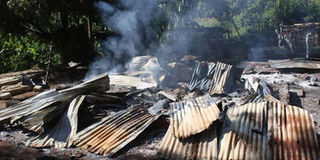Killing ‘witches’ barbaric act that does not belong in this age

The remains of a homestead in Mbarua, Tigania West whose owner residents accused of being a witch in this photograph dated January 17, 2017. PHOTO | PHOEBE OKALL | NATION MEDIA GROUP
What you need to know:
Perhaps the most reasonable explanation is that when times are hard and people cannot get enough to survive on, they turn on the most vulnerable in society and make them scapegoats for their woes.
But the majority of Kenyans today do not burn suspected witches; they set on their neighbours with machetes, accusing them of stealing elections.
Witchcraft did not originate in Africa, nor did superstition. It is a phenomenon that spans all regions, all continents and all ages. It is also the antithesis to religious belief in the sense that those who believe in the supernatural and in religion have something in common for neither can explain their faith logically or scientifically.
Because we, in this continent, are notoriously religious as the philosopher John Mbiti told us, it also means that a huge number also believe in witchcraft. Those who believe in miracles involving the birth and resurrection of Jesus Christ are, paradoxically, uncomfortable with witchcraft and have since time immemorial persecuted its practitioners, although both are but two sides of the same coin.
The reason is simple. Witchcraft has traditionally been associated with evil, while religion has always been associated with good. A pious person is supposed to be benevolent, devout, sinless and obedient to God’s edicts, while anyone who would harm you has deep links with the devil, the fallen angel who is malevolent, vindictive, destructive and incapable of empathy.
This is probably why people can go on a hysterical binge destroying without compunction suspected witches even when the accusations cannot be proved. It explains why, historically, and in every society, witches have been hunted, tortured, and executed, and why they are even today being killed regardless of the laws condemning such crimes being universal.
More than 300 years ago in a town known as Salem in colonial Massachusetts, United States, 19 suspected witches were caught, tortured, tried and hanged. The Salem trials have become a by-word for judicial intolerance coloured heavily by religious hypocrisy. A child would fall sick and her parents would claim she had been bewitched by their neighbour (sounds familiar?). The neighbour would be apprehended, tortured and convicted. The madness did not stop for a year and three months.
MORE PUBLICITY
But that was not the worst of the atrocities; it just received more publicity because records were kept. In the 15th century, hundreds of thousands of people perished in the same manner in Europe. Millions were burnt at the stake during the Inquisition, which lasted for centuries. Today, witch-hunts are still rampant in Africa, which indicates that tolerance for aberrant behaviour has everything to do with the march of time as well as the social development obtaining in different parts of the world. But there could be other explanations.
Earlier this week, it was reported that at least 10 people, mostly women, have been killed in the larger Gusii region in the recent past. Not only were they butchered or set ablaze, their houses and other property were destroyed. The strange thing is, the majority were past child-bearing age. Indeed, throughout history, elderly women have borne the brunt of witch-hunts. Why this should be so is not clear though men have also been suspected.
It is also not clear why some parts of the country are more affected by this strange behaviour than others. Witchcraft is supposed to be commonplace in western Kenya, the Coast region and in Ukambani. However, there are not as many reports about witches being swiftly dispatched in those other parts. People who study such things have a part explanation for the sporadic witch-hunts in Gusiiland. They say the area has a high population density and as a result, feuds over land, inheritance, and family vendetta are inevitable. To ease this communal pressure, they say, people resort to destroying the old and unproductive by accusing them of witchcraft, assisting nature by resorting to bizarre solutions.
LITTLE LAND
However, such a theory is hard to swallow. Most of the Mount Kenya region has very little land in proportion to its population and all sorts of rows break out over inheritance but its inhabitants do not burn witches. The only possibility is that where a population is too crowded, anything small can set off a hysterical reaction that is highly infectious. This probably explains why, during moments of high political tensions, the worst violence always occurs in the most crowded slums.
Perhaps the most reasonable explanation is that when times are hard and people cannot get enough to survive on, they turn on the most vulnerable in society and make them scapegoats for their woes. But the majority of Kenyans today do not burn suspected witches; they set on their neighbours with machetes, accusing them of stealing elections.





